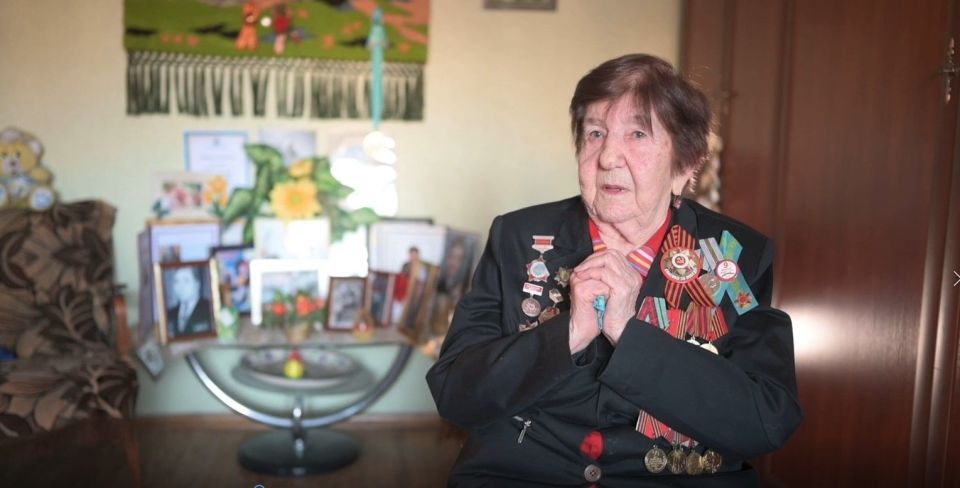Serafima Grigorievna Ponomareva headed to the front, wrote her name on the wall of the Reichstag, and became an interpreter at the Nuremberg Trials at the age of 18. The lady, now 94, told the “Nuremberg. Casus Pacis” project about her memories. We filmed and recorded Serafima Ponomareva's story. Her version of the events is presented without changes, uncut – as she remembered them. Today’s episode is the last in a multimedia series about the Nuremberg Trials interpreter. Read and watch the first and the second episode to learn how Serafima Ponomareva ended up at the trials and what she experienced in the courtroom.
The material was prepared by Sputnik Kazakhstan International News Agency in cooperation with the editors of theNuremberg: Casus Pacis project.
‘I came from the Soviet Union’
In addition to her memories, Serafima Grigorievna still has awards - orders of the Patriotic War 1st and 2nd class and 18 medals, including those issued for the liberation of Berlin and Warsaw. And there are still some unique photographs.
“The ground was baldy scorched, it was impossible. These are Katyushas (mobile rocket launchers), a hundred Katyushas. This is Zhukov. These are the shells falling on Berlin. Those days were scary. Here, we came to Berlin. The city looked like that then. Here you can see white flags hanging in the windows of Berlin. It is a sign of surrender; it meant that the Germans were surrendering. Here is Zhukov, here is the shattered Reichstag, here is Zhukov coming downstairs after writing his name on the wall of the Reichstag. I wrote something too. I wrote: "I came from the Soviet Union." Here the soldiers are serving porridge. This is Masha, she is 97 years old now, and she was a traffic controller in Berlin. When our troops entered, there were a lot of cars, and she stood to regulate the traffic. We were good friends. We had our own hospital, the central hospital of the headquarters. There were our nurses and doctors - we were such a good friends...
There was no underwear for ladies. The girls were given underpants with uniforms. And at night we were altering our underpants, trimming them, making frills, sewing underpants for ourselves. We had only one military tunic; we couldn’t change it so we had to wash it. What could we wear? Our army was very poor - we were not prepared for the war. Only after the war we were given cards for “outerwear”, “underwear” and “tobacco”. We exchanged tobacco with guys for sugar. We were poorly dressed. The only thing America helped us with was condensed milk and stew, never with clothes.
Talking about clothes, when military units were divided into American, French and British sectors, we went to the American sector with a friend to order shoes for ourselves; the workshops had already started working there. The American commandant's office detained us. We were waiting for two days until Zhukov gave the order to our people to bring us back. And we were reprimanded, and our shoes remained there, [although] we had paid money.
I got married there; this is a whole different story. The Ministry of Defense allowed me to marry; they were really strict about such things. We didn't have any entertainment facilities. We were not allowed to meet anyone. I had never kissed a man before marriage. Maybe discipline had kept us moral. There were no girls who behaved indecently. In that time people rarely got married, there were no celebrations. There were military men around, and there were only a few girls. We met by chance. When we were going to get married, my husband and I wrote an application to the unit commander. All the applications were sent to the USSR Ministry of Defense. For three months, they were deciding whether it was possible for us to get married. Then we were allowed to get married and we did it on 5 May 1949.”
After the Nuremberg trials, Serafima Ponomareva worked for another seven years at the headquarters in Berlin, and after she returned to the USSR she finally graduated from the institute in 1954. In 1961 she moved to Kazakhstan - her husband, a colonel, was assigned to his homeland, to Karaganda after graduating from the academy. Ten years later, he died due to the effects of an old wound. For twenty years, Serafima Grigorievna worked as a teacher at a boarding school, then for another thirty years - at the Polytechnic Institute. She has two daughters, four granddaughters, five great-grandsons and two great-great-granddaughters.
On 2 October 2020, Serafima Ponomareva turned 94 years old. It is important for her to leave her memories, to convey her historical testimony. She said: "We are still alive, ask us what happened." And we asked.
The material was prepared by
Correspondent Ayguzel Kadir,
Cameraman Abzal Kaliyev,
Sputnik Kazakhstan International News Agency;
Editors Irina Kareva and Lesya Orlova of the Nuremberg: Casus Pacis Project.
From the team of editors:
Personal Memoir testimony of Serafima Grigorievna Ponomareva reveals very important topic of the work of simultaneous interpreters at sessions of the International Military Tribunal. During these sessions, a new linguistic and communication normal was created - modern simultaneous interpretation. Editors of the “Nuremberg. Casus Pacis” project are working on the research about translators at the Nuremberg Trials.
























